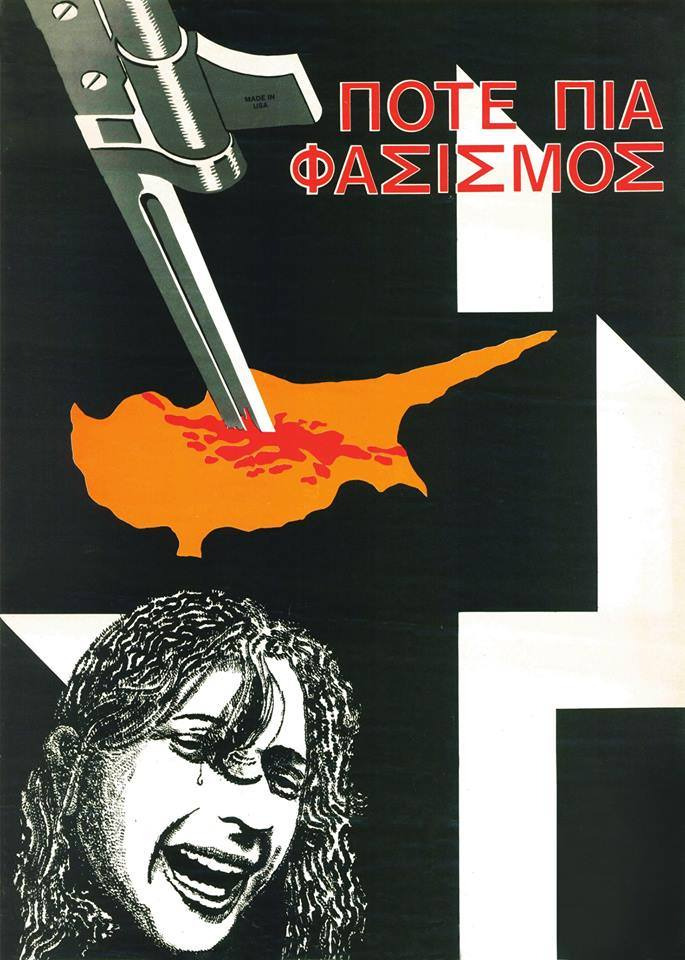
Image: ‘Never Again Fascism’
A Cypriot KSN Organiser Reflects on the 20th July 1974 Invasion
Yesterday I spoke at the #RiseUp4Revolution rally to celebrate and defend the women- and youth-led revolution taking place across Kurdistan, especially in North-East Syria/Rojava. This revolution is building a new democratic society beyond the state, based on principles of people’s self-determination, gender liberation, social ecology and a cooperative economy. The revolution in Kurdistan is the 21st century’s most profound attempt to build another world, developing the global heritage of socialist and libertarian politics into a unique paradigm for collective liberation in a communal free life.
I was proud as always to speak as a solidarity activist with the Kurdistan Freedom Movement which is building this revolution, but I was also proud to speak as a Cypriot. Today is the 46th anniversary of the Turkish state’s invasion, occupation and ethnic cleansing of our island’s northern 37%, including the economic heartlands in Kyrenia, Famagusta and the plains of the Mesaoria, as well as Rizokarpasso/Dipkarpaz in the far north where my family is from. The usual thing we say today is ‘I don’t forget’, in Greek δεν ξεχνώ, in Turkish unutmuyorum. But the question is what don’t we forget?
Of course we don’t forget the Turkish state’s occupation and ethnic cleansing, brutally violent in the initial invasion, and slow and painful against remaining enclaves in the following years. Now only Rizokarpasso has Greek families, about 350 out of a population of some 2,200, the majority Kurds following the occupation, with the remainder made up of newcomers from the Pontos (historically Greek-speaking until 1923 with lots of words in the dialect) and Turkish Cypriots present before the invasion alongside post-74 refugees from the south.
But remembering is meaningless if it’s only limited to the Turkish state and its crimes. We insult the memory of the dead, especially the 1,500 still missing, if we don’t also remember the Greek and Greek Cypriot fascists who attempted a coup five days before, and opened the door to Turkish state intervention. We do no justice to the more than 200,000 refugees from all Cyprus’ communities if we don’t recall that our people had been violently separated into enclaves for ten years already because of murderous Greek and Turkish nationalism. Remembering is meaningless if we don’t recall that it was British imperialism, under the administration of both Conservatives and Labour, which introduced a repressive, anti-democratic colonial regime especially after 1931, stated after 1945 that Cyprus could never be independent because of imperial interests, resurrected the Turkish state’s claims in the 50s to offset Greek nationalism, and enforced superficial “independence” in 1960 – at the price of ‘British sovereign base areas’ which constitute 3% of Cyprus’ entire territory, and the right of the Greek and Turkish states to intervene as “guarantors”. Likewise we only play into Turkish and Greek nationalism’s hands if we don’t remember the US-NATO imperialism which took over from the British, refused to allow the UK to leave its bases in the late 60s, first floated partition with the old colonisers in 1964, and in the figures of Henry Kissinger and the CIA tacitly approved the Turkish state’s conquest of the exact proposed area in order to end President Makarios’ non-aligned policies in the Cold War.
Maybe most importantly, it’s meaningless to ‘never forget’ if we don’t remember who it was who stood against all of this: the workers and peasants’ movement, led by the communist party AKEL, and made up of Cypriots from all communities who struggled for peace, democracy and socialism in the face of fascist violence. This experience is summed up in the person of peasant, communist and priest Papalazaros who died this month, and lost one son to Greek fascists in ‘73, and another to the Turkish army in ‘74. Only the revolutionary Left showed an alternative to Cyprus’ perfect storm of imperialism, nationalism and anti-communism.
So it feels like fate that the Rojava Revolution began on the 19th of July, 37 years and 364 days after the Turkish state’s invasion of Cyprus. This was its first conflict beyond Turkish borders since the new republic’s founding at the end of the Greek-Turkish war in 1923, a moment also capped by genocidal actions on both sides, and a massive forced ethnic cleansing of Muslims from Greece and Orthodox Christians from Turkey. Of course the Turkish state consistently exercised extreme violence within its borders across those five “peaceful” decades, particularly against Kurds, Alevis and Leftists.
Since 1974 we’ve seen the two forms of genocidal colonialism represented by the Turkish state’s occupation and ethnic cleansing in Cyprus on the one hand, and brutal assimilationism in North Kurdistan/South-East Turkey on the other, come together in its genocidal and imperialist actions in Syria and northern Iraq. But since 2012 we’ve also seen the answer to Cyprus’ ongoing occupation and partition, again led by the revolutionary Left, but this time embodied in the Kurdistan Freedom Movement: a world beyond the nation-states that have destroyed this region and shattered our common lives for the last two centuries, and yet also beyond the capitalism and imperialism that have brutalised the globe for the last five hundred years, and yet also beyond the patriarchal state which has violently dominated people of all genders for the five millennia – and with an answer to the extinction we all face under the threat of climate change.
So when we say ‘I don’t forget’, it must also be a conscious promise: a promise that remembering means fighting, in the knowledge not only of what we struggle against, but also, and more so, what we rise up for – a free life for all Cypriots, all people of the Middle East, and everyone, everywhere.
Nik Matheou, London Kurdistan Solidarity
[…] recent threats to Cyprus are even more shocking given the recent anniversary of the invasion of Northern Cyprus by Turkey. The invasion in 1974 lead to ethnic cleansing and an […]